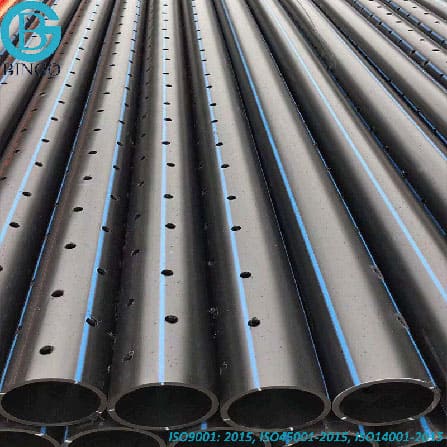Recognizing the Trick Conveniences of HDPE Pipeline for Water and Wastewater Monitoring
The use of HDPE pipeline in water and wastewater monitoring presents numerous advantages that warrant consideration. Its outstanding resilience and long lifespan make it a preferred choice for lots of tasks. In addition, the material's resistance to corrosion and chemical damage enhances its dependability in various settings. The benefits prolong beyond simply durability and resistance. Midland TX HDPE Pipe Fittings in Stock. Discovering its cost-effectiveness and ecological impact reveals much more engaging factors for its prevalent fostering in modern framework
Remarkable Sturdiness and Durability

HDPE pipe stands apart for its remarkable durability and long life, making it a favored choice in water administration systems. Built from high-density polyethylene, these pipes can hold up against substantial pressure and stress and anxiety, making sure reliable efficiency over time. Their robust nature permits them to withstand severe ecological problems, consisting of temperature level changes and dirt activities, which can create various other products to fall short.
The lifespan of HDPE pipelines often goes beyond half a century, offering an affordable remedy for communities and sectors alike. In addition, the product's lightweight buildings streamline installation, reducing labor expenses and durations. This sturdiness minimizes the need for regular repair services or substitutes, additionally boosting its financial charm.
In water administration applications, the integrity of HDPE pipes suggests fewer disturbances and boosted service connection, making them integral to lasting facilities advancement. The combination of longevity and longevity solidifies HDPE's role as a keystone in reliable water monitoring remedies.

Resistance to Rust and Chemical Damage
While numerous products catch rust and chemical damages over time, HDPE pipes exhibit amazing resistance, making them optimal for numerous water management applications. This durability stems from the molecular framework of high-density polyethylene, which is inherently non-reactive and does not corrode like metals or break down from direct exposure to severe chemicals. As a result, HDPE is very effective in environments with aggressive compounds, such as wastewater systems that might include acids, bases, and organic solvents.
In addition, HDPE pipes can endure ecological factors such as soil acidity and saline problems, even more improving their viability for diverse applications (American Plastics HDPE Pipe for Oilfield). Their capacity to keep structural integrity over time lowers the threat of leakages and failures, which is important in guaranteeing the security and dependability of water distribution and wastewater administration systems. Consequently, the resistance to corrosion and chemical damages considerably contributes to the overall efficiency and durability of HDPE piping solutions
Cost-Effectiveness and Economic Advantages
When taking into consideration the economic implications of water administration systems, the cost-effectiveness of HDPE pipelines becomes noticeable. These pipelines use reduced installment and upkeep costs compared to typical materials like steel or concrete. Their light-weight nature simplifies transportation and installment, resulting in reduced labor expenses. Furthermore, HDPE pipes show a long life expectancy, typically exceeding half a century, which translates to less substitutes and long-lasting financial savings.
Additionally, the resistance of HDPE to deterioration and chemical damage lessens the demand for costly repairs and replacements. The pipes also sustain efficient water circulation, lowering energy costs related to pumping systems. By mitigating leaks and i was reading this water loss, HDPE pipelines add to considerable economic benefits for municipalities and sectors alike. In general, the first financial investment in HDPE piping can produce substantial monetary returns over the lifespan of the water management lpg fittings system, making it a sensible selection for sustainable facilities growth.
Environmental Sustainability and Lowered Impact

Convenience and Flexibility in Installment
Due to their one-of-a-kind buildings, HDPE pipes supply remarkable versatility and adaptability in installment, making them suitable for a large range of applications. Their lightweight nature permits simpler handling and transportation, decreasing labor expenses and installment time. HDPE pipelines can be bent and shaped to fit numerous terrains and project needs, which is especially useful in challenging settings.
Furthermore, their resistance to rust and chemical damage enables for installation in varied settings without the demand for specialized protective coverings. The capability to fuse joints develops a constant, leak-free system, improving the overall stability and dependability of the setup. HDPE's versatility likewise accommodates ground movement, decreasing the risk of damage in areas susceptible to changing dirt. In general, these attributes make HDPE pipelines not just functional but additionally a recommended choice for water and wastewater management systems.
Regularly Asked Concerns
Just How Does HDPE Pipeline Contrast to PVC in Water Administration Applications?
HDPE pipeline provides premium adaptability, resistance to deterioration, and toughness contrasted to PVC. Its lighter weight assists in simpler setup, while its long life-span decreases replacement expenses, making HDPE a preferred selection in water monitoring applications.
What Is the Life-span of HDPE Pipeline Under Regular Conditions?
Under typical problems, HDPE pipelines can have a life-span ranging from 50 to 100 years. Their resilience and resistance to corrosion add to their long-term efficiency in numerous applications, making them a trusted choice for framework.
Are HDPE Pipes Recyclable After Their Service Life?
Yes, HDPE pipelines are recyclable after their life span. Midland TX HDPE Pipe Fittings in Stock. They can be refined and repurposed right into new items, substantially decreasing environmental influence and advertising sustainability within the market, making them a green selection for piping remedies
What Is the Installation Refine for HDPE Piping?
The installment process for HDPE pipes entails website prep work, trenching, pipeline combination or mechanical joining, backfilling, and pressure testing. Appropriate methods assure a resilient site here and reliable system for delivering water and wastewater properly.
Can HDPE Piping Be Used for Both Drinkable and Non-Potable Water Solutions?
Yes, HDPE pipes can be used for both potable and non-potable water systems. Their versatility, toughness, and resistance to deterioration make them suitable for numerous applications, guaranteeing safe and reliable transportation of water in different contexts.